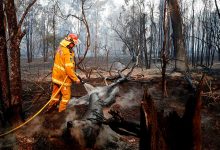The Morrison government will establish a new Australian Climate Service to coordinate and oversee preparation and responses to climate change, bringing together the work of key government agencies.
The Australian Climate Service will receive $209 million in funding in the federal budget to be delivered next week.
The new service will bring together expertise across a range of Commonwealth agencies, including the Bureau of Meteorology, Geoscience Australia, the Australian Bureau of Statistics, and the CSIRO.
The role of the Australian Climate Service will be to guide responses to emergencies triggered by extreme weather events, such as floods, storms and bush fires and will work in cooperation with Emergency Management Australia and the Government’s new National Recovery and Resilience Agency.
“This new capability will enable enhanced decision making for Emergency Management Australia and the new National Recovery and Resilience Agency,” Geoscience Australia CEO Dr James Johnson said. ‘The Australian Climate Service will generate new information and insights that are required to understand future climate and natural hazard threats and ensure better decisions are being made on things like how to build and where.”
“Through this ground-breaking partnership we will work with Emergency Management Australia and the new National Recovery and Resilience Agency to provide data and intelligence to support each phase of the emergency management continuum; Prevention, Preparedness, Response and Recovery.”
The Morrison government has faced increased pressure to respond to the growing impacts of climate change, particularly following a damaging and deadly 2019-20 summer that saw bush fires of unprecedented scale burn across much of Australia’s east coast.
The bushfires exposed gaps in the coordination of responses to the bushfire event, with state and commonwealth government agencies at times being slow to respond to the unfolding disaster.
Climate science research has stressed the increased likelihood of similar events happening in the future, as global warming amplifies the extreme nature of weather events and the increased regularity with which they can be expected to occur.
“We know just how devastating natural hazard events have been for communities all around the country over recent years. From the Black Summer bushfires and large-scale smoke events to devastating tropical cyclones and floods,” Bureau of Meteorology CEO Dr Andrew Johnson said. “We also know that with our changing climate, these events are likely to become more intense and impactful in future.”
“The new Australian Climate Service will help Australians better prepare for natural disasters well before they occur, by not just looking days ahead but years and decades. It will also enhance the Australian Government’s response during times of extreme weather, letting the community know much earlier what is coming, what’s in its way, how it will be affected and the consequences of that for the businesses and households.”
While the Morrison government has come under growing pressure to adopt more ambitious targets for reducing Australia’s emissions, it is understood that within some parts of the federal government that the growing threat posed by climate change fuelled impacts is becoming a growing concern – particularly when it comes to national security.
Chief executive of the CSIRO, Dr Larry Marshall, said that there was a challenge assessing the large volumes of data being collected about the Australian environment and translating it into meaningful recommendations for action to mitigate the impacts of extreme weather events.
“We have a deluge of data, but by turning it into insights, this will lead to tangible actions that benefit Australia. By quantifying the real risks for our people, industries, infrastructure, and supply chains, we can get ahead of what is coming next and be ready to meet it head on,” Marshall said.
“It will enable us to prepare better, to support communities across the country, and get back to business faster. Solutions from science will build the resilience of Australia’s economy to natural hazards in the future.”
The Australian Climate Service is expected to start operations at the beginning of July and will provide advice on all stages of emergency responses, including preparation, immediate responses during and after and event.






